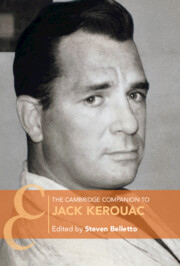Book contents
- The Cambridge Companion to Jack Kerouac
- The Cambridge Companion to Jack Kerouac
- Copyright page
- Contents
- Notes on Contributors
- A Kerouac Chronology
- Additional material
- Introduction
- Chapter 1 Kerouac’s Concept of His Duluoz Legend
- Chapter 2 Kerouac and the Profession of Authorship
- Chapter 3 Truth in Confession
- Chapter 4 The Textuality of Performance
- Chapter 5 The Spontaneous Aesthetic in The Subterraneans
- Chapter 6 Kerouac and the 1950s
- Chapter 7 The Impact of On the Road on the 1960s Counterculture
- Chapter 8 Vanity of Duluoz and the 1960s
- Chapter 9 Late Kerouac, or the Conflicted “King of the Beatniks”
- Chapter 10 Visions of Cody as Metafiction
- Chapter 11 Making the Past Present
- Chapter 12 Spun Rhythms
- Chapter 13 Kerouac’s Representations of Women
- Chapter 14 Kerouac and Blackness
- Chapter 15 Kerouac, Multilingualism, and Global Culture
- Chapter 16 The Two Phases of Jack Kerouac’s American Buddhism
- Chapter 17 Jack Kerouac’s Ambivalences as an Environmental Writer
- Chapter 18 The Essentials of Archival Prose
- Further Reading
- Index
- Cambridge Companions To …
Chapter 4 - The Textuality of Performance
Kerouac’s Spontaneous Prose
Published online by Cambridge University Press: 31 October 2024
- The Cambridge Companion to Jack Kerouac
- The Cambridge Companion to Jack Kerouac
- Copyright page
- Contents
- Notes on Contributors
- A Kerouac Chronology
- Additional material
- Introduction
- Chapter 1 Kerouac’s Concept of His Duluoz Legend
- Chapter 2 Kerouac and the Profession of Authorship
- Chapter 3 Truth in Confession
- Chapter 4 The Textuality of Performance
- Chapter 5 The Spontaneous Aesthetic in The Subterraneans
- Chapter 6 Kerouac and the 1950s
- Chapter 7 The Impact of On the Road on the 1960s Counterculture
- Chapter 8 Vanity of Duluoz and the 1960s
- Chapter 9 Late Kerouac, or the Conflicted “King of the Beatniks”
- Chapter 10 Visions of Cody as Metafiction
- Chapter 11 Making the Past Present
- Chapter 12 Spun Rhythms
- Chapter 13 Kerouac’s Representations of Women
- Chapter 14 Kerouac and Blackness
- Chapter 15 Kerouac, Multilingualism, and Global Culture
- Chapter 16 The Two Phases of Jack Kerouac’s American Buddhism
- Chapter 17 Jack Kerouac’s Ambivalences as an Environmental Writer
- Chapter 18 The Essentials of Archival Prose
- Further Reading
- Index
- Cambridge Companions To …
Summary
The usual view of Kerouac’s Spontaneous Prose is that it is a matter of writing fast without reflection, and the story of Kerouac drafting On the Road in April 1951 by typing/composing the whole novel onto a roll of paper in a three-week marathon presumably legitimizes this view. However, this chapter argues that we should understand Spontaneous Prose as a reinvention of textuality rather than simply a matter of writing fast and without reflection, which in turn allows us to understand Kerouac’s responsiveness to modern media (film and analogue recording in particular) to the paradigm of conventional print textuality, bringing into view his development of what might be termed “post-print textuality” in even his seemingly more conventionally written novels. Ultimately, this chapter shows that Kerouac’s experiments with textuality rewrote the standards by which “good literature” in the postwar era was measured.
Keywords
- Type
- Chapter
- Information
- The Cambridge Companion to Jack Kerouac , pp. 53 - 66Publisher: Cambridge University PressPrint publication year: 2024

